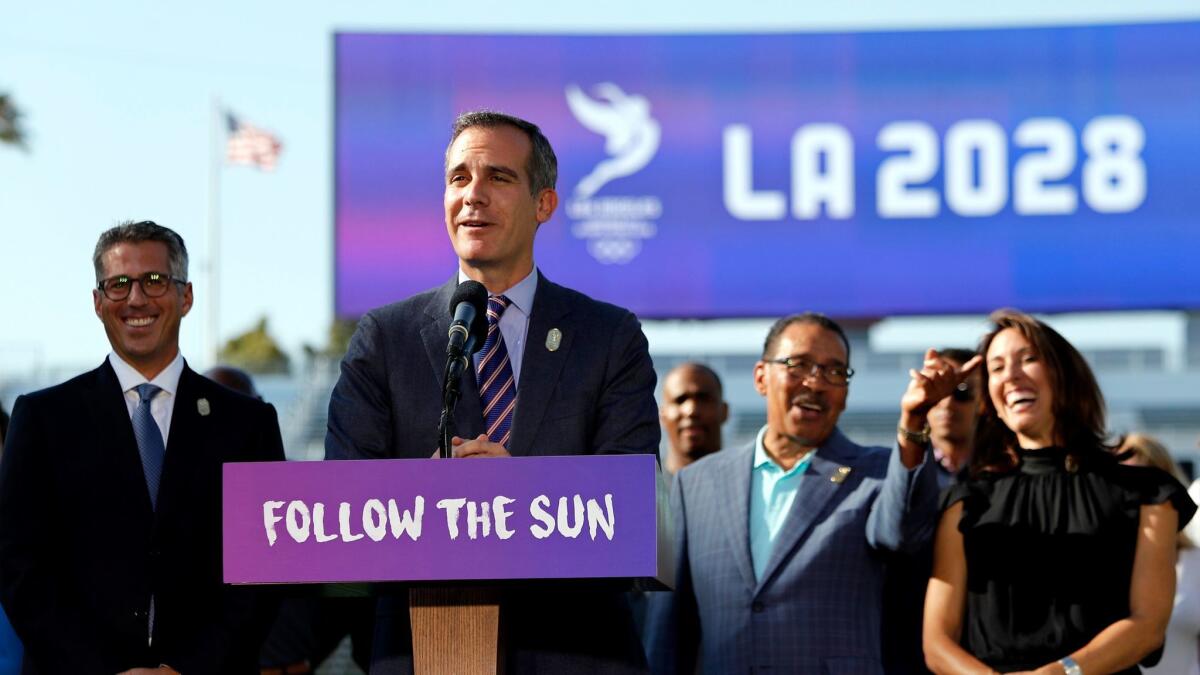Editorial: The Olympics could be a boon for Los Angeles, but it’s foolish to think we can’t lose

- Share via
Los Angeles scored a major victory this week by securing both the right to host the 2028 Summer Olympic Games and concessions from the International Olympic Committee worth hundreds of millions of dollars. Mayor Eric Garcetti and the city’s Olympic committee officials get credit for extracting a better deal from the IOC in exchange for agreeing to wait an additional four years and let Paris host the 2024 Games.
As Garcetti correctly points out, the city (not to mention the region, state and nation) has much to gain in terms of direct and indirect economic benefits, infrastructure improvements and goodwill from hosting the Games. But it would be foolish for city leaders to assume that L.A. just can’t lose, as Garcetti and other Olympics boosters have asserted. Of course it can. There are no guarantees when it comes to ticket sales, sponsorship deals or labor and materials costs for an event more than a decade away. And because the IOC refuses to share the risk of cost overruns, host cities are on the hook for any budget-busting developments.
Ideally, Garcetti would have insisted that the IOC protect the city from cost overruns in exchange for accepting the later date. But the city’s experience with the 1984 Summer Games suggests that the window for negotiations hasn’t fully closed. In the run-up to the ’84 Games, public concern about the potential for a taxpayer bailout led voters to approve a ballot measure that threatened to withdraw L.A. as host unless the IOC reduced the city’s risk. That’s what led the IOC to waive the requirement that L.A. shoulder all unanticipated costs.
If they’re done well, the Games can pay economic and civic dividends long after any Olympic-sized traffic jams are cleared.
Regardless, city leaders need to start working now to make sure the $5.3-billion project doesn’t turn into a boondoggle over the coming 11 years. Before committing the city’s treasury to such a massive undertaking, city leaders must also commit themselves and their successors to vigilant oversight. That responsibility begins as soon as next week, when the L.A. City Council is expected to take up the new host city contract. Council members must make sure that all the promises made by the IOC are in the document before the deal is finalized in Lima, Peru, on Sept. 13.
The city — and the public — must scrutinize the financial assumptions and projections of the nonprofit group acting as the local Olympic organizers. The point is to detect and respond to problems as they emerge, not after they become irreparable.
That said, the mayor and L.A. Olympic committee officials appear to have done as much as possible under the circumstances to insulate the city from financial disaster. The budget has a reserve of $487 million, and the state had agreed to kick in $250 million to help pay for any shortfall in 2024. The new 2028 deal mitigates the risk even further by cutting some costs and finding new revenues.
Los Angeles also starts out with a crucial advantage over other hosts: It doesn’t have to spend billions of dollars building anything. The plan is to use fields, arenas and other facilities that already exist or are scheduled to be built soon with private dollars. The one big-ticket item in the city’s original proposal — a $1-billion Olympic village to be constructed near downtown — was dropped in favor of a more prudent arrangement to house athletes in UCLA’s new dorms.
Some Angelenos might wonder why the city should bother putting on something that promises inconvenience at best and a costly taxpayer burden at worst. The answer is that if they’re done well, the Games can pay economic and civic dividends long after any Olympic-sized traffic jams are cleared. This means more federal funding sooner for infrastructure improvements, an influx of private investment, and spruced-up streets, parks and public spaces. This particular deal also means an immediate $160 million investment in youth sports. That may sound like small change, but to the many kids who don’t play sports because their parents can’t afford sign-up fees as high as $150, it could be life-changing.
There are also the intangible benefits of being part of a global, historic tradition — one of the few extant — that brings the entire world to your city. It can be a thrilling experience for Angelenos and their children, while selling the city to the millions who attend or watch the events from afar.
The 1984 Games turned out to be a financial success, doing more good for its host city than any Summer Games since then. L.A. may not be able to top that in 2028, but with luck and diligence it could host a world-class Olympic Games that leaves the city proud, not racked with buyer’s remorse.
Follow the Opinion section on Twitter @latimesopinion and Facebook
More to Read
A cure for the common opinion
Get thought-provoking perspectives with our weekly newsletter.
You may occasionally receive promotional content from the Los Angeles Times.






